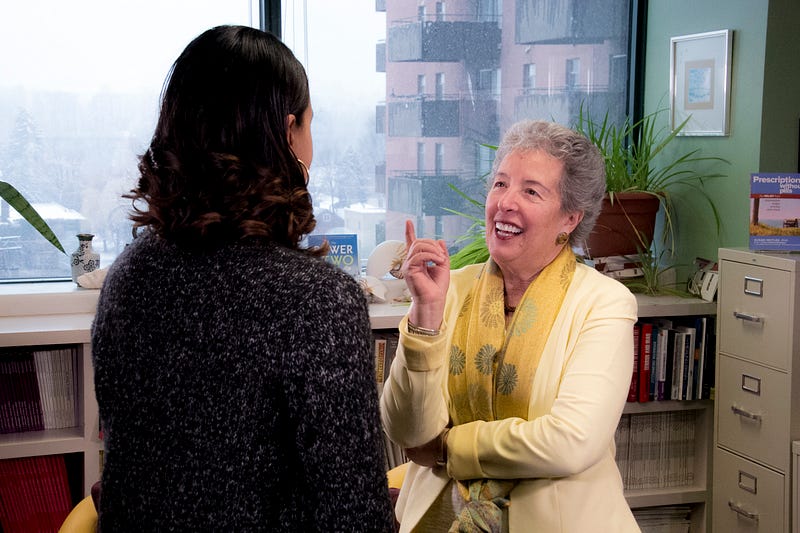As a part of my interview series with prominent medical professionals about “How To Grow Your Private Practice” I had the pleasure of interviewing…
Susan Heitler, PhD, Denver private practice clinical psychologist/marriage therapist and author. Dr. Heitler’s book for therapists, From Conflict to Resolution, teaches efficient treatment techniques. Her Power of Two self-help books teach collaborative dialogue, conflict resolution and other skills essential for marital success.
Dr. Heitler’s latest book, Prescriptions Without Pills, offers new ways to relieve depression, anger, anxiety and more.
In addition to her therapy practice and writing books, Dr. Heitler blogs for psychologytoday.com where her posts have received over 17 million reads.
Thank you so much for joining us! Can you tell our readers a bit about your ‘backstory”?
It all began with a dream I once had as a kid, a vivid dream of sitting in a rocker on our front porch. People stood in front of me, bending toward me, telling me their woes so I could help them to find new ways to handle their problems. I looked up. Wow. A long line of people all were patiently waiting for their turn to speak with me. The line along the sidewalk, which started by the large tree in front of my house, stretched up the block, far beyond where I could see. Hmm…
What made you want to start your own practice?
When my brother-in-law, Jack, a psychiatrist and neurologist, was opening an office in a new medical office at Denver’s Rose Hospital, he invited me to join him. I did. I’m still at Rose Medical Center today, though in the newest physicians’ office building, across the street from our original office. I hope to stay here until I retire. Thank you Jack!
Managing being a provider and a business owner can often be exhausting. Can you elaborate on how you manage both roles?
In elementary school I was the kid whose hand was always waving in the air with answers to teachers’ questions. Now I wave my hand by writing books, journal articles, and blogposts. I speak at continuing education workshops and on audio podcasts. I make videos. And I continue to love doing therapy. Running an office, by contrast, is not my thing. So I delegate.
For a long time I had a business partner, a psychologist colleague, who handled the office management. Since her retirement, my office staff — Janet and Teresa, two wondrously capable women who job-share — have managed all the business side of my work on their own. They make and change appointments, keep the books, do the taxes, do billing, distribute my client overload to the other therapists in our suite, greet clients, market my books to libraries and on Amazon, make sure I eat lunch, and more. I pay occasional attention to marketing, but mostly I just do therapy with clients and publish my ideas.
As a business owner, how do you know when to stop working IN your business (maybe see a full patient load) and shift to working ON your business?
I pay attention to referral numbers. When they go down, I make sure that my SEO is adequate, and maybe even add some google adwords, so people who want psychotherapy can find me.
For the most part though, I trust that when my caseload ebbs instead of flowing, it’s because I’m meant to be putting my energies into other projects — finishing a book, giving continuing education courses for other therapists, posting blog articles, upgrading my youtube channel…
From completing your degree to opening a clinic and becoming a business owner, the path was obviously full of many hurdles. How did you build up resilience to rebound from failures? Is there a specific hurdle that sticks out to you?
My main resilience source is family. With one husband, four kids (now adults with families of their own), and, currently, 15 grandchildren, I turn to enjoying them to replenish and sustain my positive energies.
In all of my career, my biggest hurdle was studying for my psychologist licensing exam. The mistake I made was to try to carve out bits and pieces of study time at home between the demands of caring for my children. Intertwining family and studying proved to be terribly stressful. I would have been better off studying only out of the house, and only between set hours like I would have for a job.
I didn’t learn that lesson though clearly enough until completing my first book, David Decides About Thumbsucking — a story for children with a section for parents on ending thumbsucking habits. Sandwiching in the writing here and there between parenting responsibilities again was a mammoth mistake.
From that point forward though I got it. I wrote my subsequent books, journal articles, and blogposts only at my office and during work, not family, hours.
As to “failures,” I never use that word. Mistakes are for learning.
Also, I remind myself often of the 80–20 rule. 80% of good results come from 20% of what one does. I see that pattern especially in my blogging where 20% of my posts account for 80% of my reads. Knowing this reality eases the disappointment when something I’ve written doesn’t fly.

What are your “5 Things You Need To Know To Grow Your Private Practice” and why?
- Be good at what you do. Satisfied customers tell their friends. So study up, keep learning, and keep growing.
- Enjoy your work, your clients, your office staff and your colleagues. Clients feel the warmth and joy the minute they enter your suite.
- Build specialties. My initial focus was on conflict resolution and it’s role in marriage therapy. More recently my clinical specialties have been techniques for rapid relief from depression, anger and anxiety — the subject of my latest book, Prescriptions Without Pills.
- Be public. Write. Do TV, newspaper and magazine interviews. Get your ideas, and your name, out there.
- Give to get. Aim to share what you have learned. My books, journal articles, blogposts and youtube videos have taken oceans of time to produce. They make back very little in direct income. At the same time, as an author I have been able to charge significantly more for hourly therapy services than almost any of my peers — so in the long run all the giving has paid off financially as well as in the satisfaction of being able to help, like in my dream as a kid, so many people.
Many healthcare providers struggle with the idea of “monetization”. How did you overcome that mental block?
My goal initially, working when my children were young, was to earn enough to cover the costs of childcare for the hours when I was at the office. We lived on my husband’s earnings.
Later, when my husband’s entrepreneurial business meant he had no salary, we both appreciated my being able to earn enough to keep us going.
The bottom line was that we needed the money, so charging for services seemed perfectly fair.
What do you do when you feel unfocused or overwhelmed?
Go home. Sleep. Exercise. Read. Talk with my husband. Enjoy my family. Do activities that benefit my community. Play my violin. Or get some sleep.
I’m a huge fan of mentorship throughout one’s career — None of us are able to achieve success without some help along the way. Who has been your biggest mentor? What was the most valuable lesson you learned from them?
My husband has been my biggest mentor for running my business. He’s an excellent businessman. As to therapist mentors, I worked for five years as co-therapist with a brilliant energy therapist, Dale Peterson. There’s videos of us working together on my Youtube channel, and also several descriptions of our work on my psychologytoday.com blog. Dale’s techniques made me aware of arenas that impact our feelings and thoughts that go way beyond anything I ever learned about in graduate school.
One more most valuable lesson — I learned in my internship year from my supervisor, Howie Lambert PhD, to have people close their eyes to look inward. I do lots of treatment with my clients keeping their eyes closed. That way they can receive vital input from their subconscious mind. There’s self-help versions of these eyes-closed techniques in Prescriptions Without Pills.
What resources did you use (Blogs, webinars, conferences, coaching, etc.) that helped jumpstart you in the beginning of your business?
My initial marketing jump-starters turned out to be the physicians in the medical office building where I work. I walked from office to office, introducing myself to the docs. They gave my name to their patients, who in turn passed my name on to their friends, and, voila, I had a full practice.
Unfortunately, doctors now seldom recommend specific therapists. Now they say, “Check you insurance booklet to see what psychologists your insurance plan cover.” I’m not listed on any plans because I do not take insurance, only private pay, though I am generally glad to reduce the fee for people who can’t afford my steep hourly rate.
I have been practicing long enough, and have become well known enough though, that the referrals keep on coming. Also, since most people nowadays find their therapist via the web, I do keep up my the SEO on my office website, TherapyHelp.com, and sometimes also use google adwords to bolster my numbers.
What’s the worst piece of advice or recommendation you’ve ever received? Can you share a story about that?
When I first launched my office, multiple seasoned therapists told me that if I was going to build a private practice I would have to start out by seeing clients in the evenings. I said to myself, “No way. Evenings are for my family.”
I never worked a single evening. And the practice grew just fine.
Please recommend one book that’s made the biggest impact on you?
In The Art of Loving, author Erich Fromm wrote, “When you are younger, you are attracted to romantic partners who are like what you are not. (That’s a good description of my Irish poet boyfriend, and then my professional football player boyfriend…) As you get older, you begin to become attracted to someone who is like what you like best about yourself.” That’s my husband.
Those words of wisdom enabled me to know immediately when I met the man who was to become my husband that he was the person I wanted to marry.
My husband has made the most impact on my and my career of anyone or anything. My husband supported me both financially and emotionally so that I could make it through my graduate school training even though we had multiple babies along the way. Our marriage has given me four beloved kids, four treasured kids-in-law, and fifteen grandkids to adore. Plus my husband has given me financial stability, someone to love, a buddy to play with both at sports and in our string band, and so much more. In addition, the marriage we’ve built together has given me confidence and competence in offering therapy for couples and in writing about the how-to’s of marriage communication.
As you may have guessed, I’m a huge advocate for marriage, and for learning the skills that make marriages successful. That’s why I have written so many books and blogposts on marriage, and specialize in couples therapy in my clinical work.
Where can our readers follow you on social media?
Youtube channel: https://www.youtube.com/results?search_query=susanheitler+channel
TEDx talk: Susan Heitler PhD, TEDx Talk
PsychologyToday.com blog: Resolution, Not Conflict

For other incredible interviews, please check out our podcast: Healthcare Heroes.
A special thanks to Dr. Heitler again! The purpose of this interview series is to highlight the entrepreneurs, innovators, advocates, and providers inside Healthcare. Our hope is to inspire future healthcare providers on the incredible careers that are possible!
Stay in the loop — Follow NPHub to get the latest updates when we post new interviews: Facebook, Instagram.


